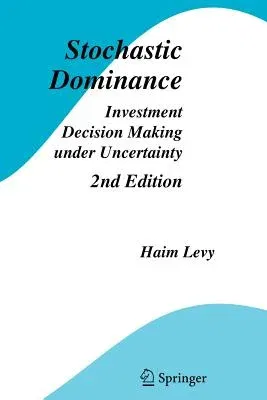Stochastic Dominance: Investment Decision Making Under UncertaintyPaperback, 25 November 2010

Qty
1
Turbo
Ships in 2 - 3 days
In Stock
Free Delivery
Cash on Delivery
15 Days
Free Returns
Secure Checkout
Part of Series
Studies in Risk and Uncertainty
Print Length
439 pages
Language
English
Publisher
Springer
Date Published
25 Nov 2010
ISBN-10
1441939830
ISBN-13
9781441939838
Description
Product Details
Book Format:
Paperback
Country of Origin:
NL
Date Published:
25 November 2010
Dimensions:
23.39 x
15.6 x
2.34 cm
ISBN-10:
1441939830
ISBN-13:
9781441939838
Language:
English
Location:
New York, NY
Pages:
439
Publisher:
Weight:
635.03 gm

